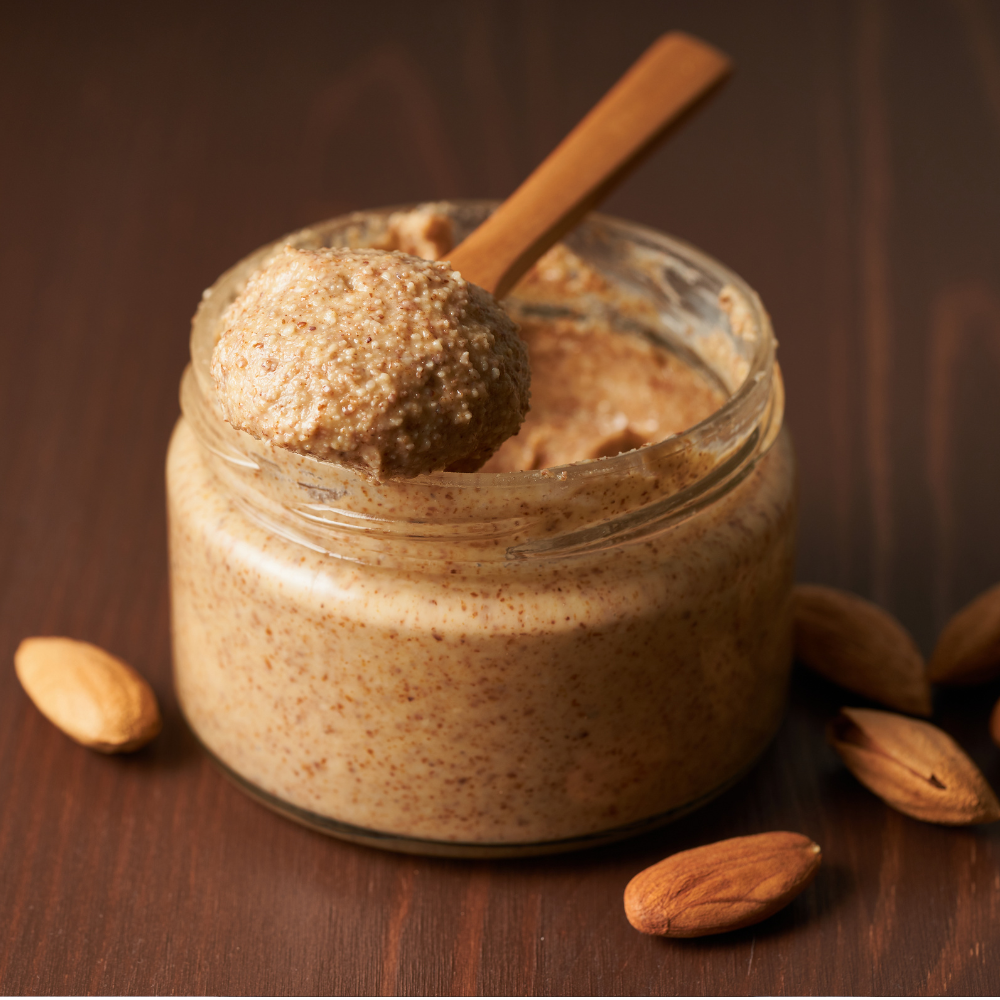Can Dogs Eat Almond Butter?

Can Dogs Eat Almond Butter? Exploring the Safety and Benefits
Dogs are cherished members of our families, and as responsible pet owners, we want to ensure they receive a healthy and balanced diet. With the rise in popularity of alternative nut butters, such as almond butter, many dog owners wonder whether their furry friends can enjoy this creamy treat. In this article, we will delve into the question, “Can dogs eat almond butter?” and examine the safety and potential benefits of feeding almond butter to our canine companions.
Understanding Almond Butter:
Almond butter is a spread made from finely ground almonds. It is rich in nutrients like protein, healthy fats, and fiber, making it a popular choice for human consumption. However, dogs have different dietary needs than humans, and certain foods that are safe for us may not be suitable for our four-legged friends.
Can Dogs Eat Almond Butter? Exploring Safety:
- Potential Risks:
While almond butter is generally safe for human consumption, dogs may have different reactions to certain foods. Some dogs may have allergies or sensitivities to almonds, which can lead to symptoms such as itching, gastrointestinal upset, or even more severe allergic reactions. It’s crucial to monitor your dog for any adverse reactions when introducing new foods into their diet. - High Fat Content:
Almond butter is known for its high-fat content, which can be a concern for dogs, especially those with certain health conditions. Consuming excessive amounts of fat can lead to pancreatitis, a painful inflammation of the pancreas. If your dog has a history of pancreatitis or other pancreatic issues, it is best to avoid feeding them almond butter. - Potential for Choking Hazards:
Almond butter has a sticky and thick consistency, which can pose a choking hazard, especially for small dogs or those prone to swallowing without chewing properly. It is important to supervise your dog while they are consuming almond butter to prevent any potential choking incidents.
Benefits of Almond Butter for Dogs:
- Nutritional Value:
While almond butter should be given to dogs in moderation, it can offer some nutritional benefits. Almonds are a good source of protein, healthy fats, vitamin E, and minerals like magnesium and potassium. These nutrients can contribute to your dog’s overall well-being. - Healthy Fats:
The healthy fats present in almond butter, such as monounsaturated fats, can help promote a healthy coat and skin for your furry friend. These fats also provide an energy source for dogs, aiding in the absorption of fat-soluble vitamins. - Mental Stimulation:
Almond butter can be used as a tasty and engaging treat for dogs, especially when used in interactive toys or as a training reward. It adds variety to their diet and can help keep them mentally stimulated.
Feeding Almond Butter to Dogs:
- Moderation is Key:
When it comes to sharing almond butter with your dog, moderation is crucial. A small amount as an occasional treat is generally safe for most dogs. However, it should not exceed more than 10% of your dog’s daily caloric intake to avoid an unbalanced diet. - Natural and Unsweetened Varieties:
When selecting almond butter for your dog, opt for natural and unsweetened varieties that do not contain additives like xylitol, a sweetener that can be toxic to dogs. Read the label carefully and ensure the ingredient list is minimal, without any harmful additives. - Consider Individual Health and Allergies:
Each dog is unique, and their dietary needs may vary. If your dog has any underlying health conditions or known allergies, consult with your veterinarian before introducing almond butter into their diet. They can provide personalized advice based on your dog’s specific needs.
Further Exploration of Almond Butter for Dogs:
Beyond its nutritional profile and potential risks, exploring almond butter for dogs involves understanding its role in their diet and overall well-being. While some dogs may enjoy the taste and texture of almond butter as an occasional treat, others may not tolerate it well due to individual sensitivities or preferences.
Training and Enrichment:
Almond butter can serve as a valuable tool in training sessions or enrichment activities for dogs. Its rich aroma and flavor make it a highly enticing reward that can motivate dogs to learn new behaviors or engage in interactive games. By using almond butter strategically as a positive reinforcement, pet owners can reinforce desired behaviors and strengthen the bond with their furry companions.
Alternative Uses:
In addition to being a standalone treat, almond butter can be incorporated into homemade dog treats or recipes to add flavor and nutritional value. Mixing almond butter with dog-safe ingredients like oats, pumpkin, or banana can create delicious and nutritious snacks that dogs will love. However, it’s crucial to be mindful of portion sizes and ingredients to ensure the treats are balanced and suitable for your dog’s dietary needs.
Supplementary Considerations:
While almond butter can provide certain nutrients beneficial to dogs, it should not replace essential components of their diet, such as complete and balanced commercial dog food. Treats like almond butter should complement a well-rounded diet rather than serve as a primary source of nutrition. Pet owners should prioritize feeding their dogs high-quality dog food formulated to meet their specific nutritional requirements and consult with a veterinarian for guidance on appropriate treats and supplements.
In conclusion, the question of whether dogs can eat almond butter involves careful consideration of its nutritional value, potential risks, and practical applications. While almond butter can offer certain benefits as a tasty treat or training aid, it’s essential to approach its use with moderation, caution, and awareness of individual factors. By understanding the role of almond butter in a dog’s diet and taking proactive steps to ensure safety and balance, pet owners can enhance their canine companion’s overall health and happiness while enjoying the occasional indulgence of this creamy delight.


